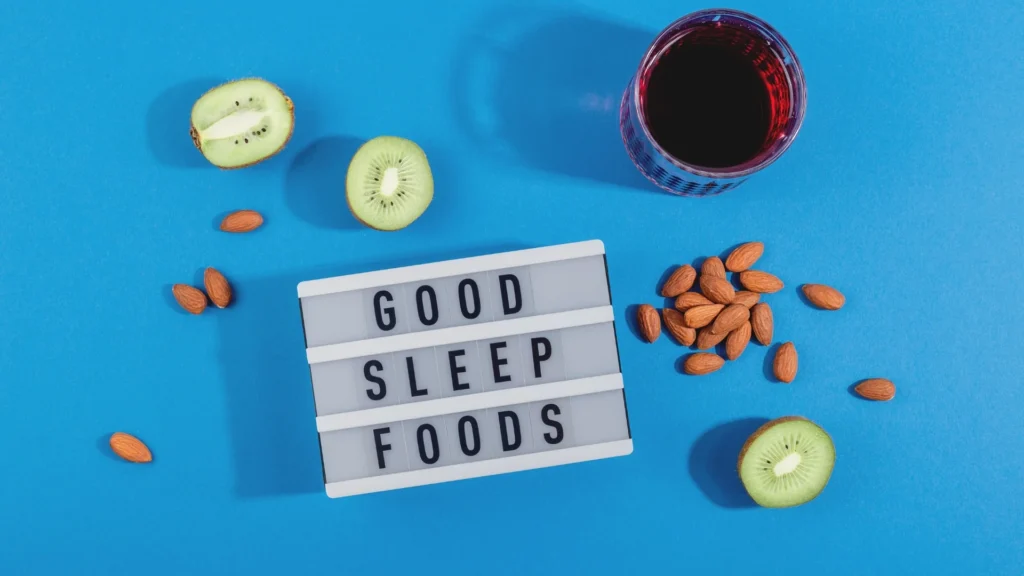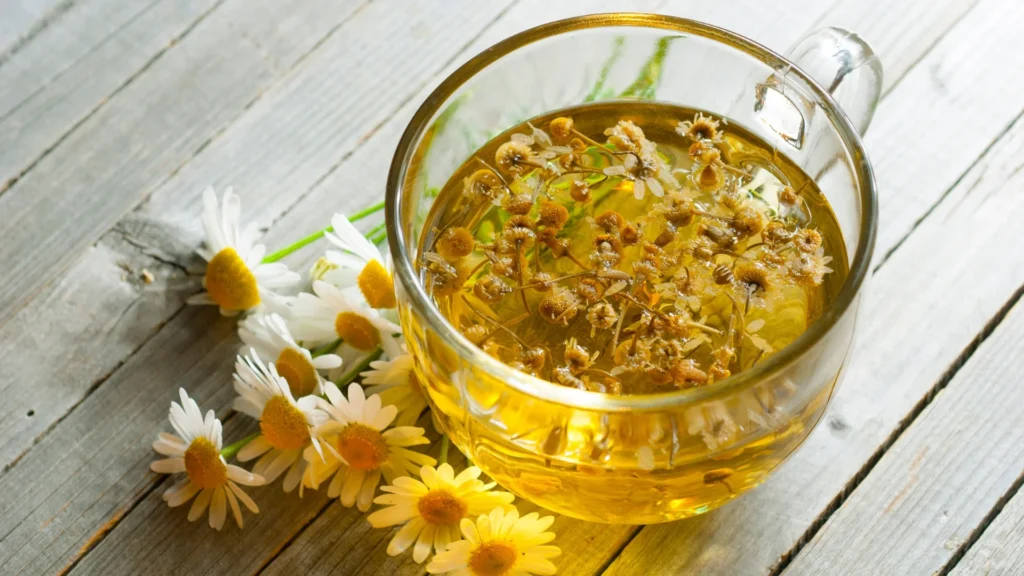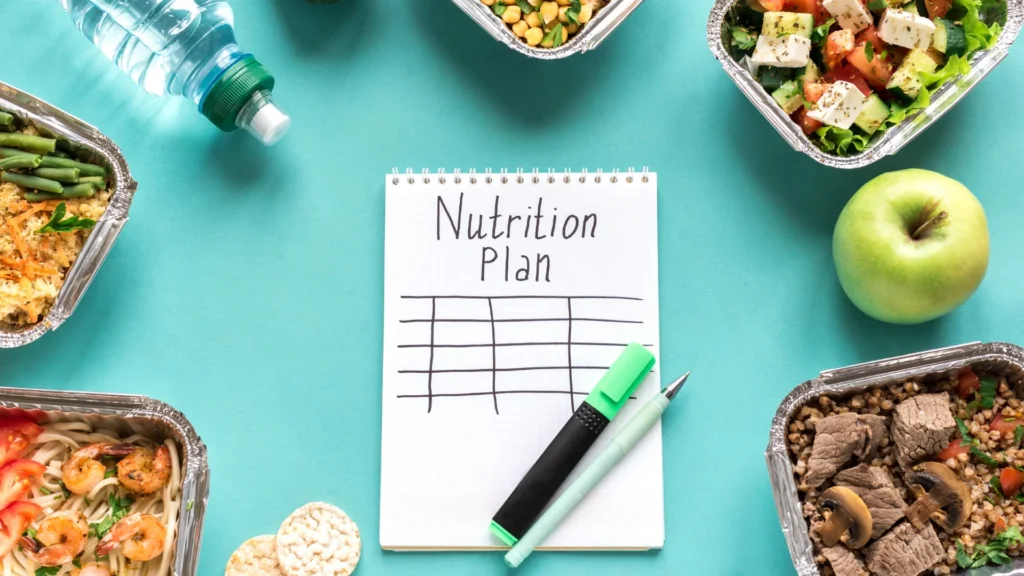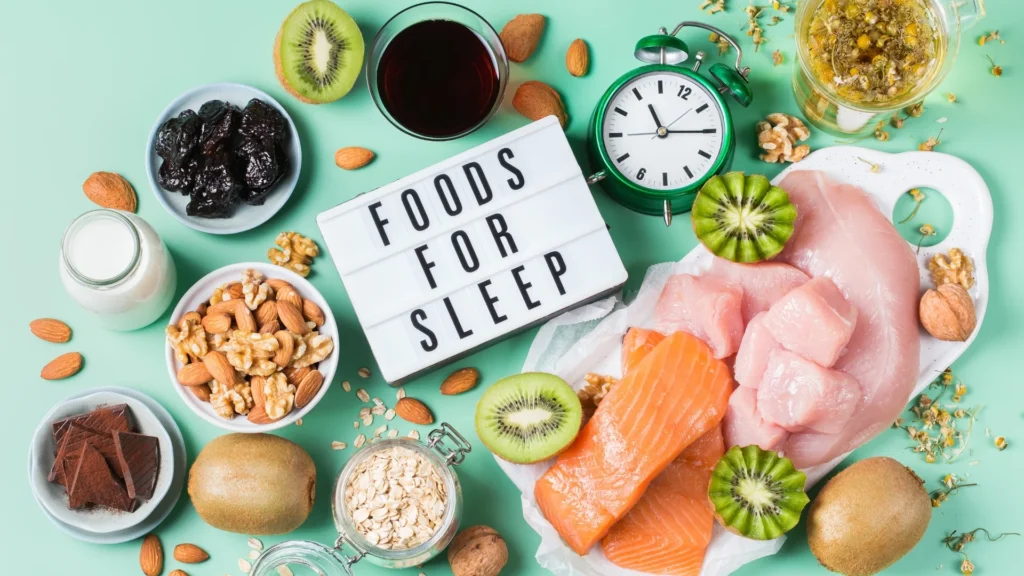Struggling with sleep? You’re not alone — 1 in 3 individuals in Singapore face the same issue. Sleep deprivation can lead to serious health problems including diabetes, heart disease, and depression. But before resorting to medication, consider this: you can consume some foods for better sleep.
Certain foods contain nutrients that promote relaxation and better sleep — “sleep-friendly foods”. However, some can disrupt your sleep by causing discomfort or increasing alertness. In this article, we delve into how what you eat affects your sleep and introduce you to foods for better sleep. Let’s explore the fascinating intersection of diet and rest.
Understanding the Impact of Food on Sleep

When we think about a good night’s sleep, our first thoughts might drift to a comfy mattress, blackout curtains, or perhaps a soothing bedtime routine. But what if the secret to sweet dreams and restful nights is actually in your kitchen? Yes, you read that right. The foods you eat can significantly impact your sleep quality.
The science behind this revolves around specific nutrients and compounds found in certain foods that influence our sleep patterns. Let’s break it down.
How Certain Foods Affect Your Sleep
Tryptophan
This essential amino acid helps produce serotonin – a neurotransmitter that plays a key role in maintaining sleep. Tryptophan-rich foods include turkey, eggs, and cheese.
Magnesium
Known for its calming effects, magnesium aids in regulating melatonin – the hormone responsible for directing your sleep-wake cycles. Foods rich in magnesium include green leafy vegetables, nuts, and seeds.
Melatonin
Naturally produced by our bodies, melatonin signals that it’s time to sleep. Some foods like cherries and oranges naturally contain melatonin.
The connection between diet and sleep isn’t just about what you’re eating either; it’s also about when you’re eating. Eating heavy meals close to bedtime can lead to discomfort and indigestion, interfering with a good night’s sleep.
By understanding the effects of food on sleep, you can make mindful dietary choices that promote rest and relaxation. So next time you’re setting up your meal plan, remember: your menu could be the ticket to better slumber!
The Best Foods to Consume for a Good Night’s Sleep

When it comes to enhancing sleep quality, certain sleep-promoting foods have been identified as valuable allies. These foods contain specific nutrients that can help regulate sleep patterns and improve the overall restfulness of your slumber.
Almonds
Almonds are more than just a crunchy snack; they are nutritional powerhouses when it comes to sleep. Rich in magnesium, almonds may help improve sleep quality, especially for those who have insomnia. Magnesium’s role in promoting sleep is thought to be due to its ability to reduce inflammation and help lower levels of the stress hormone cortisol, which is known to disrupt sleep.
How to incorporate almonds into your diet:
- Enjoy a handful of almonds as an evening snack.
- Add sliced almonds to a bowl of yogurt or oatmeal.
- Blend them into a smoothie for a nutrient-packed nightcap.
Kiwifruit
Kiwifruit might seem like an unconventional bedtime snack, but this small, fuzzy fruit is packed with sleep-promoting compounds. It contains serotonin, a neurotransmitter that helps regulate the sleep cycle. Studies suggest that consuming kiwifruits regularly may improve both sleep quality and duration.
How to incorporate kiwifruit into your diet:
- Slice kiwifruit and eat it on its own or with a spoonful of cottage cheese.
- Mix it into a fruit salad with other sleep-supportive fruits.
- Puree kiwifruit into a refreshing sorbet perfect for an after-dinner treat.
Tart Cherries
Tart cherries and their juice are excellent sources of melatonin, the hormone responsible for regulating the body’s internal clock and signaling it’s time to sleep. Research suggests that tart cherry juice can increase both sleep quality and quantity.
How to incorporate tart cherries into your diet:
- Drink a glass of tart cherry juice in the evening.
- Add dried tart cherries to trail mix or granola.
- Swirl tart cherry compote over desserts or blend them into smoothies.
Each of these foods not only supports better sleep but also contributes positively to overall health with their array of vitamins, minerals, and antioxidants. Integrating them into your diet is simple, enjoyable, and beneficial on multiple fronts.
Other Diet and Lifestyle Tips for Better Sleep

While adding certain foods to your diet can greatly improve sleep quality, taking a comprehensive approach to sleep hygiene is equally important. Here are four practical tips to enhance your diet for better sleep:
Tip 1: Avoid Heavy Meals Before Bed
Issue: Indulging in high-fat meals before bed can lead to discomfort due to indigestion and heartburn.
Solution: Choose lighter meals in the evening and have a small, healthy snack if you get hungry before bedtime.
Snack Suggestions:
- A banana with almond butter provides a satisfying mix of carbohydrates and magnesium, known for its muscle-relaxing properties.
- A small bowl of whole-grain cereal with milk delivers both complex carbs and calcium, aiding in melatonin production.
Tip 2: Alcohol and Sleep: Finding the Right Balance
Moderate Alcohol Consumption:
- A glass of wine might help you relax, but it’s important to understand how alcohol affects your sleep cycle.
- Small amounts can potentially help you fall asleep faster.
Excessive Alcohol Consumption:
- More than a moderate amount disrupts REM sleep, often leading to wakefulness in the second half of the night.
- To avoid this, limit alcohol intake and have your last drink at least 3 hours before going to bed.
Tip 3: Warm Milk for Sleep — Is It Effective?
Tryptophan in Warm Milk:
- This amino acid is a precursor to serotonin, which is then converted to the sleep hormone melatonin.
- Warm milk may provide psychological comfort from childhood routines or associations with relaxation.
Non-Dairy Alternative:
- Those who prefer non-dairy options might enjoy almond milk, which contains magnesium and can help promote sleep.
Tip 4: Caffeine Intake and Its Impact on Sleep
Caffeine Sensitivity varies between individuals; some may experience disrupted sleep even when consuming caffeine early in the afternoon.
Recommendations:
- Generally, avoid caffeine at least six hours before bedtime to minimize its stimulating effects.
- If you love a warm beverage in the evening, consider herbal tea or decaffeinated coffee as alternatives.
These tips not only pave the way for better sleep but also contribute to overall health and well-being. By paying attention to your body’s signals and adjusting your dietary habits accordingly, you can create an environment conducive to quality sleep.
Read More: Did You Know These 7 Amazing Benefits of Drinking Milk?
Exploring Herbal Teas as Natural Sleep Aids

Herbal Teas for Sleep: A Timeless Remedy
The practice of sipping herbal tea before bedtime has been cherished for centuries, as a way to unwind and signal the body that it’s time to rest. Why are herbal teas linked with better sleep? The answer lies in the unique compounds they contain, which can directly impact our sleep-wake cycle.
Chamomile Tea: The Sleep Inducer
Chamomile tea tops the list when it comes to sleep-friendly beverages. Rich in apigenin, an antioxidant that binds to specific receptors in your brain, chamomile may help reduce insomnia and promote sleep.
Valerian Root Tea: Nature’s Tranquilizer
Next up is valerian root tea, often referred to as ‘nature’s tranquilizer’. Its active ingredients can help increase levels of GABA, a chemical messenger that helps regulate nerve impulses in your brain and nervous system, leading to reduced anxiety and improved sleep quality.
Passionflower Tea: The Relaxation Booster
Finally, there’s passionflower tea. Studies suggest it might enhance the quality of sleep by boosting levels of GABA in the brain, just like valerian root. By drinking a cup of this soothing brew before bed, you may find yourself drifting off into restful slumber more easily.
So next time you’re struggling with sleeplessness, why not try swapping out your regular nightcap for one of these calming herbal teas? You might be surprised at how effective this simple switch can be!
Read More: Is ‘Cooling’ Better Than ‘Heaty’?
Putting It All Together: Designing a Sleep-Friendly Diet Plan

Now that you know which foods can help you sleep better, it’s time to incorporate them into your daily meals. A balanced diet with sleep-promoting foods is essential for maintaining a healthy sleep routine and overall well-being.
Where to Begin?
To start, focus on including the nutrient-rich foods mentioned earlier into your meals. Here are some practical ways to do that:
Breakfast
Start your day with a meal that combines complex carbohydrates and protein. For example, you could have whole grain toast with almond butter or a bowl of oatmeal topped with almonds and cherries.
Lunch
For your mid-day meal, choose lean proteins like turkey or chicken along with quinoa or brown rice. Don’t forget to add some leafy greens such as kale or spinach as well.
Dinner
Make sure your evening meal is lighter and includes foods rich in tryptophan, like grilled salmon with sweet potatoes on the side.
Remember, it’s not just about what you eat but also when you eat. Having heavy meals too close to bedtime can interfere with your sleep. Try to finish dinner at least three hours before going to bed.
Hydration Matters Too!
Did you know that staying hydrated can also contribute to better sleep? Herbal teas, in particular, can be soothing and help you relax before bedtime. Consider incorporating chamomile or passionflower tea into your evening routine while enjoying a book or calming music.
However, be mindful of your liquid intake close to bedtime to avoid frequent trips to the bathroom during the night.
Keep It Simple and Listen to Your Body
Designing a diet plan that promotes good sleep doesn’t have to be complicated. Pay attention to how different foods affect your sleep quality and make adjustments accordingly. Remember, everyone’s needs are unique, so it’s essential to find what works best for you.
Your journey towards a better night’s sleep starts with what you put on your plate.
Read More: Breakfast, Lunch & Dinner: Fantastic 100 Calorie Cutting Made Easy
Conclusion
By now, you’ve probably realized the profound impact your diet can have on your sleep quality. The importance of a restful night’s sleep cannot be overstated, and with the right foods, we can significantly enhance our sleep experience.
Just as an athlete fuels their body for performance, so too can you optimize your diet for the primary purpose of rest and recovery. The foods that help you sleep aren’t just bedtime snacks but part of a larger lifestyle change aimed at prioritizing your overall health and well-being.
Imagine this: Tonight, you prepare a delicious dinner featuring some of the sleep-enhancing foods we’ve discussed. You savor each bite, knowing that you’re nourishing your body in a way that will support a restful night’s sleep. Later, instead of reaching for a late-night snack that may disrupt your slumber, you brew a cup of soothing herbal tea and enjoy it as part of your bedtime routine.
That’s not just an enjoyable evening—it’s an investment in your health. It’s a commitment to better sleep, and it starts with making mindful food choices. So why not start tonight?
Read More: How to Create a Sleep-Friendly Bedroom Environment
FAQ
Q1: Can food really impact sleep quality?
Yes. Nutrition and sleep are closely intertwined. Certain nutrients can promote better sleep by affecting the production of sleep-regulating hormones like melatonin and serotonin.
Q2: What foods are best to consume before bed?
Foods rich in tryptophan, magnesium, calcium, and B vitamins. Examples include almonds, kiwi, tart cherry juice, and fatty fish.
Q3: Should I avoid eating before bed?
Not necessarily but be mindful. Heavy meals can cause indigestion and disrupt your sleep. A light snack is acceptable if you’re feeling hungry just before bedtime.
Q4: Is alcohol good or bad for sleep?
Both. While alcohol might help you fall asleep, it interferes with your REM stage of sleep which is vital for memory consolidation and mood regulation.
Q5: Does warm milk really help with sleep?
It can. Milk contains tryptophan which can increase production of brain chemicals that promote sleep. There are non-dairy alternatives available for those who prefer.
Q6: Can caffeine affect my sleep?
Absolutely. Caffeine is a stimulant that can interfere with your ability to fall asleep. It’s best to limit your intake or consume it only in the morning.
Q7: Are herbal teas effective for improving sleep?
Yes. Herbal teas like chamomile, passionflower, and valerian have been used traditionally to promote relaxation and better sleep quality.


